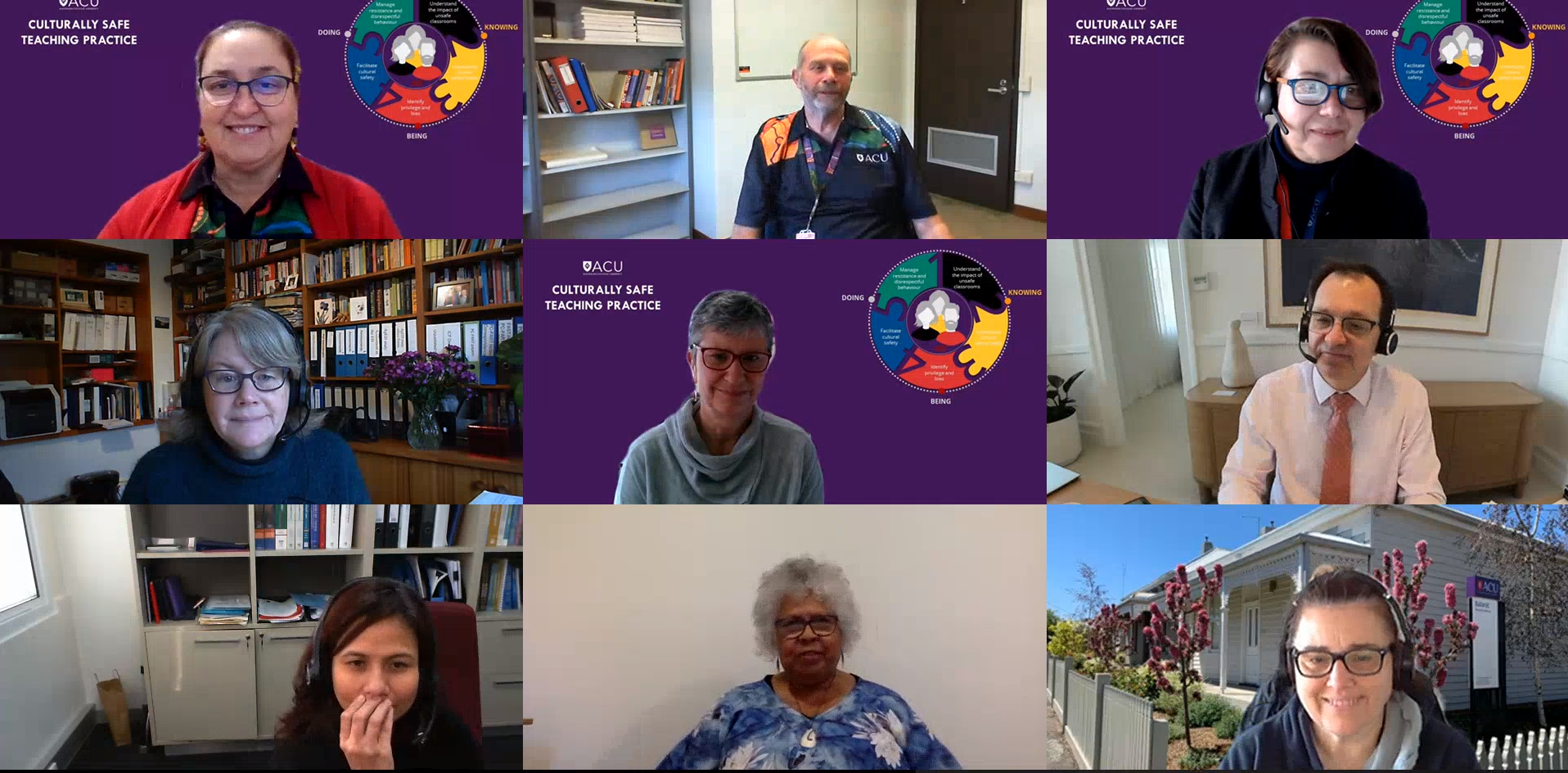The Vice-Chancellor’s Spirit of Reconciliation Award has been awarded to the Cultural Safety in the Classroom Project team from the Faculty of Health Sciences for developing a microcredential.
The Vice-Chancellor’s Spirit of Reconciliation Award has been awarded to the Cultural Safety in the Classroom Project team from the Faculty of Health Sciences for developing a microcredential.
Led by Associate Professor Joanna Zubrzycki from the Discipline of Social Work in the School of Allied Health, the team have developed a key deliverable of ACU’s Reconciliation Action Plan: a professional learning package that builds the capacity of Aboriginal and Torres Strait Islander and non-Indigenous Faculty of Health staff to create culturally safe classrooms.
The original team included seven members: Associate Professor Joanna Zubrzycki, Deputy Head of School Associate Professor Christian Lorenzen, Senior Lecturer Mr Liam Langford, Lecturer and Coordinator of the Away from Base Program Ms Machellee Kosiak, Manager, Learning and Teaching Ms Helena Williams, Lecturer in Social Work Dr Amelia Wheeler and Lecturer in Physiotherapy Dr Marcella Danks. Marcella retired from the university in the middle of the project.
The UNMC500 Culturally Safe Teaching Practice microcredential produced by the team equips FHS academic staff with the knowledge, skills and confidence to facilitate respectful and culturally safe teaching and learning environments.
It is underpinned by critical race pedagogy and informed by a range of evidence – including a survey of 95 staff members from the Faculty of Health Sciences (FHS), a comprehensive literature review, and a scoping of Australian university programs. The ultimate purpose is to build culturally safe teaching and learning environments for Aboriginal and Torres Strait Islander students and staff.
At the heart of the project has been a deep commitment and acknowledgement that any work which engages with cultural safety requires a process that models cultural safety in and of itself.
The team hoped to inspire participants to be courageous by constructively and sensitively dealing with challenging classroom scenarios including incidences of racism. Machellee Kosiak said, “[The aim] was to identify the most appropriate and effective ways of developing academic skills and knowledge in order to address cultural safety in classrooms.”
According to Associate Professor Lorenzen, “The impact in this unit is about challenging personal and professional privilege, which takes commitment and courage. The participants who are currently engaged in this unit are demonstrating a commitment to reflection, which is a critical stage of development before they can change their teaching practises.”
Building this into the microcredential required ongoing critical reflection on privilege and the development of innovative and rigorous collaborative processes between the FHS multidisciplinary project team, Aboriginal and Torres Strait Islander colleagues, Elders, mentors and external moderators.
The engagement and influence of cultural advisors was invaluable in ensuring the academic quality and cultural integrity of the program content. This is exemplified in the script that formed the basis of the filmed classroom scenario, which was co-constructed with input from Aboriginal and Torres Strait Islander colleagues and produced by an Indigenous cinematographer, hence strengthening its power to influence and transform teaching practices.
Liam said, “The whole unit has been focused on the impact, with particular emphasis on Indigenous ways of knowing, being and doing in the structure of the program and the learning outcomes. The particular focus on doing challenges participants to develop strategies and skills to respond to microaggressions and racism in the classroom.”
The project team have received overwhelmingly positive feedback. The microcredential participants who are currently enrolled in the unit are blown away with the thoughtfulness and the comprehensive content of the unit and the teaching approach, and they thank the team for stretching them in ways they didn’t anticipate.
Their Aboriginal moderator noted, “I think this is an excellent body of work and a definite progress in positioning Aboriginal and Torres Strait Islander ways of knowing, being and doing.”
While this knowledge is particularly critical for the FHS, given the potential roles their graduates have in addressing disparities in outcomes experienced by Aboriginal and Torres Strait Islander peoples, the team hopes their efforts will extend beyond the faculty.
Their hope is that more staff will have the courage and capacity to become powerful allies in promoting Indigenous knowledges and perspectives across the university, in ways that are transformational and enduring.
The knowledge and skills that Indigenous and non-Indigenous FHS academic staff will develop are transferable to all learning and teaching contexts, regardless of their discipline and curriculum focus.
Helena said that the team are particularly proud of building relationships with participants, FHS staff and local Indigenous higher education units, but “an ultimate measure of success will be changes in classroom practices and Indigenous student satisfaction, retention and success.”

Visit Service Central to access Corporate Services.